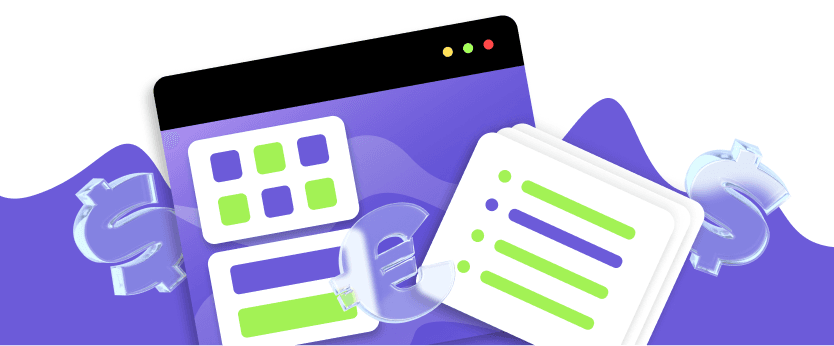Whether a business provides services, creates products, sells goods, or whatever else, it needs an active merchant account to enable all sorts of transactions, including top popular credit and debit card payments. In today’s reality, streamlined electronic commerce is only possible when you arm it with a well-working electronic payment system.
How can a merchant account solution help you launch it? What are merchant accounts, and how can you open one in India, Bangladesh, or another country of the world? Find the answers in our comprehensive guide.
What Is An Internet Merchant Account?
A merchant account is a specialised bank account designed to set up advanced e-commerce and allow businesses to accept payments from customers via bank cards. The key points here are speed and convenience. Thanks to a properly working banking system, customers can pay using a credit and debit card terminal or one of the supported solutions — see what are payment gateways — on the chosen merchant’s website or app.
By connecting a card machine and enabling other payment gateways, merchants can significantly extend their customer base and push up sales. For them, online merchant services bring benefits such as secure processing and settling electronic payments, immediate credit card processing, and various useful options for online payment convenience.
It is important to understand that a retailer who uses this type of online banking does not deal with fiat or virtual money funds. The connected account serves as an intermediary. It accepts money from a customer, verifies the transaction, and only then transfers funds to the e-commerce account. So, the entire checkpoint process is carried out by the merchant acquiring bank, which simplifies selling/buying for both businesses and their clients.
Get Your Merchant Account
Why You Need a Merchant Account to Accept Card Payments
Although many customers still pay cash, credit and debit card transactions are growing in popularity every day, and this is a global trend! If you’re launching an e-commerce store in India, Bangladesh, or another country, your success highly depends on your ability to process payments efficiently. The advantages of a merchant account in this respect are obvious:
- Secure banking
- Fast transactions
- Extended payment options
(extra gateways, shopping carts, etc.) - Customer trust
For markets and retailers, merchant accounts ensure they can win the competition, which tends to be tough in all domains. It should be noted that the Indian and Bangladeshi consumer markets are among the 10 fastest-growing economies in the world. This makes both countries appealing areas for investors, new businesses, etc. Online trading is the key ability here, so your company surely needs an effective business bank account to keep pace with the trend.

Online Merchant Accounts and Payment Gateways
You may wonder why you do not simply use a preferable payment gateway for your transactions. Yes, this solution is available. You and your clients can easily pay using a specific payment gateway. However, your clients will have to indicate your bank account details every time they wish to purchase a product or service from your business, which is inconvenient.
For a deeper comparison, see our guide on the key differences between a merchant account vs payment gateway.
On the other hand, an active merchant account will let you start accepting payments more smoothly. With it, you can add as many methods as you want, and your clients will only need to pick a banking option and pay with a couple of clicks.
The choice of banking methods you can connect to your cashier is wide. The options include internationally recognized payment systems like Stripe and PayPal. If trading goods in India or Bangladesh, you might need to enable popular and trusted methods such as UPI, PayTM, bKash, and Nagad. The more options you offer, the more your clients appreciate your brand. This approach is also effective for platforms focused on specific use cases like payment gateway for dating site, where flexible integration and user trust are essential.
How to Open a Merchant Account
An entrepreneur needs to contact their bank or PSP (Payment Service provider) to establish a merchant account. Before doing so, they have to analyze their type of business so that they know their monthly payment scope, necessary methods, etc. Sometimes, the product type or suppliers with which you team up also matter. So, be ready to present your financial institution with the most detailed plan of your commerce. Then, your steps should be as follows:
Select a credit card provider
First, you choose a credit card brand for your transactions. We recommend exploring the terms of all available providers. This will let you pick one that best suits your business model.
Choose a pricing plan
You will have to pay specific fees for payment operations conducted via your merchant account. First, this will be a fixed rate paid for each transaction (flat-rate commission). Then, be ready to pay extra fees like one for processing and settling payments, price spread fees, international payment commissions, etc. Your chosen provider will also charge a certain subscription fee.
Pick a merchant account provider
The next move is to choose the account provider available in your region. Again, shop around enough to pick the exact company you need. It should give all the necessary options. Opt for one with flexible features and the possibility to switch between the plans.
Submit your documents
The final step is to provide your papers to the account provider. The necessary documents include:
- Your company’s certificate of incorporation
- Your ID
- A cancelled cheque or bank letter
- Legal papers that prove your manager’s rights, etc.
Make sure to submit all the necessary documents to protect yourself against unnecessary delays and denials.
Connect payment gateways
As soon as your merchant account is ready, you need to enable at least one payment gateway — for example, the Cashfree payment gateway — for seamless customer payments. Many providers offer integrated merchant account functionality that you can switch on with a couple of clicks.
Key Features to Choose the Right Merchant Account Provider
Your business size and type of business define which merchant account provider is good for you. For instance, you might need some specific API options for upscale sales. However, there are features that every account supplier should be able to offer:
Variety of Banking Methods
The list of payment options should include internationally accepted instruments like VISA and Mastercard, local specialties like UPI, uPay, bKash, etc., and whatever payment system you need.
Good Integration
Your customers should be able to accept payments online in their local currency and conduct transactions using other ones if necessary. The chosen provider’s T&Cs should comply with the financial regulations and marketing realities in your country.
High Level of Security
Your supplier must provide enough security measures to protect your funds and data against possible threats. Your clients should be able to pay easily and safely. The must-have features include proper encryption, PCI compliance, and anti-fraud tools.
Extra Tools
If you run an eCommerce business, you might need a set of special tools for convenient shopping on your website. Their list may include a shopping cart, options for mobile payments, analytics, and more.
If you need more information about this or that feature, you can contact the support of your chosen provider. It is reasonable to check its user reviews and ratings before subscribing.

Pricing Models
Including online merchant services in your business scheme is an effective strategy for success. However, you should bear commissions in mind, too. Their set depends on your provider and chosen plan, but some fees remain standard throughout all of them:
Setup charge
Providers may add a once-only setup fee for your account setup to your bill. The commission may cover additional services needed to prepare your account for seamless operations.
Monthly service fees
Paid on a monthly basis to enable the entire spectrum of payment services. Some providers only charge this if your transaction traffic deviates from your plan limits.
Transaction charges
A specific fee for each transaction, typically ranging from 0.5% to 2.5%. The final size depends on your provider, bank, card brand, and pricing plan.
Interchange-plus fees
Small charges applied to the profit you earn. If you have a certain price markup, your provider will charge a minute fee from that difference.
Specific commissions
These may include additional fees for international transactions or other specialized payment types required for your business.
There are rarer types of fees, like the statement commission. However, most providers no longer charge them. Your chosen provider's fee list may include only some of the above-explained charges.
It’s up to you to decide which fee type is more fitting for your business. A flat-rate system may seem more convenient since it may be difficult to predict the number of transactions per month. However, pay thorough attention to other fees applied to your plan. There might be high interchange-plus commissions, etc.
How to Choose the Right Merchant Service Provider for Your Business
Tips on how to pick the right merchant account provider continue our blog. This is not the thing you can do, hands down. However, you can follow these rules to simplify your choice.
Shop Around
Do not grab the first company advertised. Instead, take patience and study a number of providers. You should explore their terms, supported payment gateways, fees, and other features. This can be a time-consuming undertaking, but you can use consistent online comparisons provided by trusted websites in your area.
Check the Targeted Provider’s Trustworthiness
Once you have picked a company from which you can order an effective merchant account, you should examine its reliability. The simplest way is to check user reviews. You can also use rating lists compiled by experts.
Explore the Support Service
Your chosen provider should offer quality support that every customer can reach easily and fast. It should be available at least during the working hours. Fast responsiveness and proper expertise are two essential requirements.
Opt for a Dedicated Merchant Account or Specialized Merchant Account Niche
If you run a regulated business, picking a provider ready to offer you a merchant account to accept credit and debit card payments may present a challenge. Many companies avoid partnerships with restricted industries due to potential financial or reputational losses. However, you can switch to providers that serve regulated sectors at once.
These providers have ready-made merchant account solutions for your business, and your plan may include advanced security tools and other useful instruments for maintaining your account. Still, you should be ready for higher chargeback fees and other extra fees designed to enhance the security of all activities done through your account.
Regulatory Considerations and Compliance
In India and Bangladesh, you’ll need a similar set of documents to open a merchant account. They include the following:
India
- Business registration
- GST identification number
- Tax license
- Your business’s terms and conditions (they are needed to comply with the Information Technology and eCommerce laws.)
- A primary business bank account
- Other specific licenses (export trading, etc.)
Bangladesh
- Company registration
- A trade license
- Tax registration
- DBID registration
- A standard business bank account
On the other hand, merchant account providers also should comply with the e-commerce requirements imposed by the countries. In particular, they should work within the PCI DSS system. This is a system of security standards established by Mastercard, VISA, American Express, Discover, and JCB.
These standards secure every little step during a payment. The PCI standards force providers to employ powerful protective measures against fraudsters and other online threats.
Explore Related Payment Solutions
Final Word: Before You Get a Merchant Account
Today, a merchant account will be a backup pillar for your business. It is necessary to provide your customers with a safe and convenient online payment system. The market contains enough solutions for this purpose. They offer various pricing models with convenient fees and effective sets of features. So, all you need to do is pick a fitting merchant account provider for your company and open your merchant account with it.
Online Payment Company #1
Online payment solutions for all types of businesses since 2019
Subscribe to stay updated
on industry news, insights, and exclusive offers
Frequently asked questions
What Are Merchant Account Services?
How to Create a Merchant Account?
What Should I Know When Choosing a Merchant Account?
What Are Typical Merchant Account Fees?
What Are the Main Benefits of a Merchant Account?






